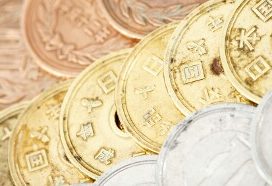Home / Forex news / USD/JPY Rises After BoJ Shares Crash Most Since 1991

The Japanese yen weakened against its US peer to kick off the trading week, despite positive economic readings to start 2021. The yen, which has failed to strengthen this year, could not find support on the Bank of Japan (BoJ) attempting to reassure financial markets. Is more weakness on the way, despite the recovery pushing ahead in the world’s third-largest economy? Perhaps the answer might depend on the central bankâs stock price.
The Coincident Index, which measures a wide range of factors, such as factory output, employment, and retail sales, climbed to 91.7 in January, up from 88.2 in December.
The Leading Composite Index also advanced from 97.7 in December to 99.1 in January. This index monitors account inventory ratios, machinery orders, stock prices, and other critical data for the Japanese economy.
On Monday, the Eco Watchers Survey for current economic conditions surged to 41.3 in February, up from 31.2 in January. The Eco Watchers Survey outlook topped 51 after staying below 50 for more than a year.
Meanwhile, the central bank reported that banking lending increased 6.2% year-over-year in February, up from 6.1% in January.
In January, Japan’s current account surplus was relatively flat from the same time a year ago, missing market forecasts by more than half. It was the lowest monthly surplus reading since early last year.
Speaking at a semi-annual policy review meeting on Friday, BoJ Governor Haruhiko Kuroda insisted that he did not see the necessity to widen an implicit band established for its long-term interest rate target.
Financial analysts stated that this prevented investors from selling their bonds at a loss and transitioning into stocks. This also led to the biggest BoJ stock plunge since December 1991, falling 19%. When Kuroda was asked about the long-term sustainability of stock prices, Kuroda dismissed the concerns, telling lawmakers:
The Bank of Japanâs subscription certificates are completely different from the normal shares of listed companies. The price is not the responsibility of the bank.
The BoJ has been investing large sums of cash into the stock market for years, recently adding more than $1 billion to its exchange-traded funds (ETFs).
Japan’s bond market was mixed to kick off the trading week. The benchmark 10-year bond edged up by 0.015% to 0.11%. The three-month bill slipped 0.011% to -0.1%, while the 30-year bond slipped 0.1% to 0.68%.
The USD/JPY currency pair rose 0.24% to 108.65, from an opening of 108.41, at 12:33 GMT on Monday. The EUR/JPY dropped 0.19% to 128.86, from an opening of 129.12.
If you have any questions, comments, or opinions regarding the Japanese Yen, feel free to post them using the commentary form below.
Original from: www.earnforex.com
No Comments on “USD/JPY Rises After BoJ Shares Crash Most Since 1991”